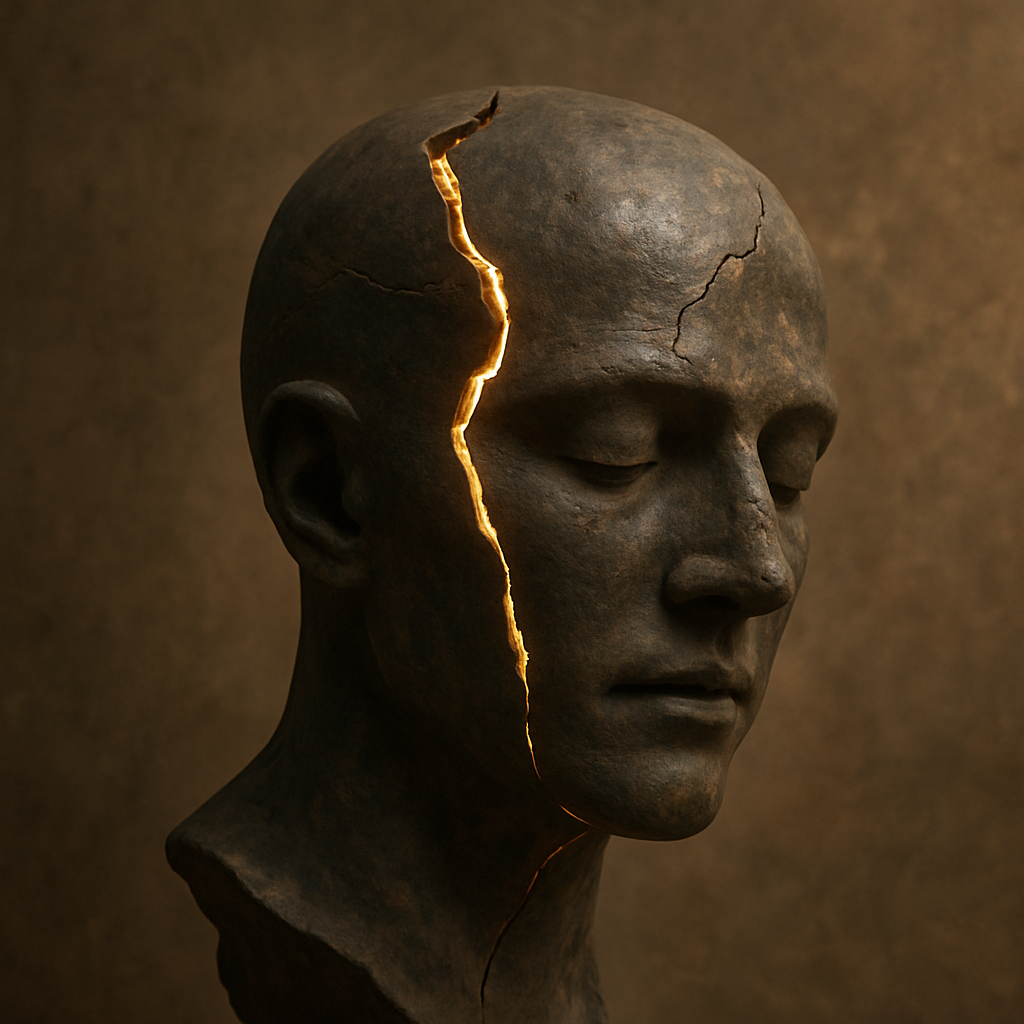In today's journey, I would like to examine together a profile that we all know very well.
This is a profile shared by a friend, an acquaintance, someone we know from a distance, maybe a little bit of us, in short, most people.
If a little criticism is made to this person, he immediately becomes so defensive that you would think that his life has been torn from him.
- Did I mean it like that?
- You're always picking on me anyway
He starts saying things like this.
Then he doesn't want to see us for a while, because we must have hurt him last time, he shouldn't be hurt.
You will say, well, if he was hurt, why doesn't he tell us, why does he get defensive, why does he go away? He will never say it.
He is known for constantly feeding himself back in the middle of arguments saying, "I'm like this, this is my character, it doesn't change."
Sometimes we say a simple word, or we don't say it, we just look at it, we are offended. Why did he look at me like that? Why did he say that? What did he really mean? Hey God.
Oftentimes these feelings turn into assumptions of "they don't like me, they exclude me".
What is the concept of praise for this type of person who is so impervious to criticism?
He grabs it in the air, in the air! He loves it! He wants to be praised and appreciated, but if he is rejected, his world falls apart.
On top of that, such people blame themselves, they keep thinking that I must have done something wrong, who am I anyway.
I am not saying that they are bad people, they even sacrifice themselves to avoid hurting us. Drawing boundaries for them is like torture, they try to "manage" somehow.
Also, because of the effort they make to hide their feelings, they develop a persona that is overly cheerful, harsh or indifferent. They try not to show their true feelings, but they are scared to death of appearing weak.
But who are they? Fragile people!
You may have noticed that in this whole pattern of behavior, it is as if these fragile people are trying to prove to us that in order to remain fragile, they have created a ministry of defense, as if they are integrated with this fragility.
You may think that I am angry with fragile people because I am talking about so many negative behaviors. But no...
They are my darlings, perhaps the most like myself.
In this article we will try to explore together:
Is vulnerability really a weakness, or can it be our deepest strength?
Philosophical and Scientific Background
Philosophical Perspective
Nietzsche and the Wound: The Starting Point of Transformation
What did Nietzsche say? Man is deepened only by suffering. And if we ask him, sometimes man's greatest strength is born out of his deepest wound.
The deepest wound in man leads to his greatest transformation.
We have already mentioned Nietzsche's oft-cited doctrine of Amor fati, or love suffering.
Nietzsche speaks of a being who is transformed not in spite of suffering but through suffering.
I think that what we call fragility is actually the wound that is the source of this pain: a crack, an opening, a point of aching.
But from a different perspective, that crack can also be the place where light enters.
I like to match this philosophy with formations in nature.
There are some rocks, for example, that do not break. First they burn, then they take shape as they cool. Like obsidian...
The obsidian stone that forms after volcanic eruptions, when the lava cools rapidly, is actually a kind of glass.
But it is not like ordinary glass; it is hard, sharp and transmits light.
What makes it so unique is the destruction it goes through. First there is an explosion, which causes pressure and scorching, and then gradually it cools down and obsidian is formed...
Human beings sometimes resemble such a formation:
The fracture within us does not just scatter everything. It forces us to merge into a new form. And that new form may be simpler, sharper and stronger than the old one.
"So, in fact, the wound is not just a scar, but sometimes the very transformation into a new substance."
According to Nietzsche, human fragility creates a space that reforms rather than destroys its potential.
In other words, a wound is not only a pain, but also an aesthetic event:
Our most authentic encounters with ourselves often occur when we are most broken.
Amor fati therefore involves not only "acceptance" but also an upright stance:
To make every part of life, especially the painful ones, a source of beauty, strength and meaning.
Levinas and Derrida: The Fragility of the Encounter with the Other
What we call fragility is not only an inward matter. Sometimes it arises at the moment we encounter the other. According to the French-Hebrew philosopher Emmanuel Levinas:
True ethics begins the moment we meet another person face to face. That face creates a great responsibility for us, and in doing so it demands nothing from us.
Levinas sees the human being not as a closed self, but as an open being. According to him, we are defenseless in the face of the presence of the other. Because that face arouses in us the necessity to respond.
What we call "I" becomes clear only in the presence of the "other."
This means that:
While we think we are strong, in fact we are often closed to the other. But true openness is to risk being vulnerable.
Also the French philosopher Derrida says:
The real encounter always carries risk.
Because to be truly open to the other is to be unprotected.
To come into contact with someone is not just communication; it is taking the risk to be open.
And this openness involves a kind of vulnerability courage.
Brene Brown and the Courage to Feel:
Vulnerability Is Not Weakness
American researcher and storyteller Brene Brown discusses the concept of "vulnerability" in the context of psychological shame and belonging studies.
Society has taught us for years:
"Be strong, don't show your feelings, don't be open!"
But Brown's years of fieldwork have shown the opposite.
The deepest bonds are forged when people are most open, that is, when they are most vulnerable.
Brene Brown is simply saying:
Vulnerability is not weakness; it is courage at its most naked. In fact: "Not being afraid to show your feelings is true courage."
Vulnerability, according to Brown, means:
- "I don't know."
- "I'm hurt."
- "I was wrong."
But still being true to yourself.
Vulnerability is a moment of unmasking. And this moment is the clearest sign not of weakness, but of deep humanity.
Scientific Perspective
Polyvagal Theory
The Relation of Fragility to the Nervous System
American neuroscientist Stephen Porges, With the Polyvagal Theory he tells us that:
Being vulnerable is not just a psychological state.
It is one of the oldest social reflexes of our nervous system.
The theory states that there is a large nerve line in our body called the vagus nerve, which affects the heart, lungs and digestive system.
The most important role of this nerve is:
Is-there-danger-or-are-we-safe?
It asks this question and then shapes our body with its automatic responses.
Porges organized this structure into three levels:
- Freeze/shutdown (the most primitive response)
- Fight or flight
- Social participation system (the most developed system)
And it is in this third area that vulnerability is born.
That is, making eye contact, softening the tone of voice, touching, being friendly with someone is possible when our nervous system says "I am safe".
We can think of it like this: Vulnerability is a state in which our nervous system says, "there is no threat now, you can open up."
But he emphasizes that for people who have experienced trauma in the past, who have been rejected a lot, or who have felt worthless, this system may be impaired.
So even if the person is actually safe, the body may still be signaling "danger."
So for some people, vulnerability is not just an emotional barrier, but a neurological one.
Where Trauma is Written with the Body
Bessel van der Kolk and Emotional Armor
Bessel van der Kolk, is a psychiatrist who pioneered modern trauma studies.
In his famous book "The Body Keeps the Score" he explains:
Trauma is experienced not only in the mind, but also in the body.
And most of the time, the mind forgets, but the body remembers, whether we like it or not.
Children who were often criticized, ignored, excluded, humiliated when they were young grow up after a while... We say, who knows how upset those children must have been.
Perhaps those children are not only upset. They are also developing a defense with their body.
How does this defense reflect on the body?
- If we feel like we need to be on guard all the time
- If we contract our shoulders
- If we clench our teeth
- If we tense up at even a warm contact
- If we have the habit of building walls instead of emotional openness
Van der Kolk argues that these reflexes are not something that a person chooses on purpose. The body protects itself in order to not to relive the danger. In other words, armor is physical learning, not mental.
Emotional Armor:
A Survival Strategy
The person who does not allow resentment often wears a mask of "coldness" or "indifference". But that mask is often a neurological shield worn over an old wound.
Van der Kolk makes the important observation:
The traumatized person often unconsciously assumes that the pain of the past will recur now. Therefore, he/she feels the need for defense at every contact.
In other words, the fear of vulnerability we experience today may actually be an echo of where we were hurt in the past.
Prefrontal Cortex:
Center of Thinking Courage, Not Fearless
The prefrontal cortex (PFC), located in the frontal region of our brain, is responsible for high-level processing such as decision-making, empathy, planning and social relationships.
But more importantly:
This is precisely where our ability to show openness despite fear takes shape.
The PFC is in constant communication with a more primitive center of the brain, the amygdala (threat perception). When the amygdala says "danger!", the prefrontal cortex steps in and asks:
"Wait a minute... Is there really a threat, or is this just a past echo?"
Through this process:
- We can stop and think before taking risks.
- Choose to express our emotions instead of suppressing them.
- Apply empathy and openness in our social relationships.
In essence:
Emotional openness is a conscious act, not an instinct. And this action is made possible by the prefrontal cortex.
Real Problems and Solutions
The Compulsion to Appear Powerful:
Mental Armor of the Modern Age
Today, "being strong" often means not "not being offended" but acting as if you have never been offended.
- We always have to be busy,
- We always have to be productive,
- We always have to be stable.
This looks like "success" from the outside, but from the inside it creates something completely different:
It breaks the connection with ourselves.
Because every feeling, every sign of weakness is labeled "uselessness", "inadequacy", "failure".
Therefore people suppress what they feel, they don't talk about their feelings, they are ashamed to ask for help.
What is happening?
- People can't cry, but they have panic attacks
- They can't talk, but they break down inside
- They say "I'm fine", but their bodies are full of diseases.
In short, this "obsession with appearing strong" actually distracts us from our most basic need, emotional connection and inner balance.
We are constantly expected to wear our emotional masks. Our bonds in our relationships are related to how well we perform, and inevitably all these things cut us off from sincere contact, from real emotional bonds.
This turns us into people in a masquerade ball where we don't know them but we try to build a personality through their masks.
Well, but what should we do?
I think it is easy to do, but there are a few steps.
First of all, we need to know how to get in touch with our own vulnerabilities and make peace with them. If we don't know something, we should be able to say that we don't know, if we are afraid of something, we should be able to say that we are afraid, if we don't feel enough to do something, we should be able to say that we don't feel enough to do it. If we are offended, misunderstood, upset, whatever makes us feel bad, I think we should be able to share this with our spouses and friends.
Isn't it enough that we are still saying "I don't shine, I don't shine, but if I shine, I shine very badly"?
I think if we can manage to do these things, the next step should be:
What we said, we need to get strength from our wounds.
I think in order to gain this strength, first of all we need to realize, is someone else making us feel this bad feeling, or are some of our own wounds itched and we are experiencing these feelings because of ourselves.
If at this point we think that the other party is causing it, we need to get rid of that first. After all, we are not the puppets of others, no one else can rule us but ourselves, and if they did, we would be like robots.
First of all, we need to realize that our feelings are caused by ourselves, and if they are not, we need to find ways to turn them into that.
Otherwise, we surrender to the outside world and just watch life happen to us. We are not here to be bystanders, we are here to be the protagonists of our own lives.
As we have said, our biggest wound will be our biggest transformation, and I believe that the primary way to do this is to take ownership of our emotions. When we are able to do this, it means that we start to get stronger.
After this point, we can share our feelings comfortably, because when we open up to the other person, there are two possibilities, either the other person really wanted us to feel bad and that's how we find out and we draw a boundary between us and that person, or the other person expresses themselves in a logical way and then we see that:
We didn't actually have the right feeling, we misunderstood.
I don't think we should leave it at that. If a person has a feeling, there must be a reason for it.
Oftentimes it could be a childhood trauma, or something that happened to us in a previous relationship, an unexpected situation that makes us involuntarily feel unnecessary.
When we dig deeper into why we feel this way, seeing and understanding the main problem will prevent us from experiencing those feelings over and over again unnecessarily.
If not, we can try to overcome this problem by consulting a psychologist or psychiatrist. They can help us find the cause of such problems in a more professional way.
We cannot solve a problem without knowing what it is.
Aggression is a way of hiding and accumulating our own inner problems. It may seem logical in the short term, but in the long term it tires us out and we gradually begin to break down psychologically.
I can't resist giving another personal example.
My wife has a taste for watching sensational episodes of old Turkish TV series. It has been like this since I've known her, she watches them in her spare time, laughs and amuses herself. I also join in from time to time.
A few years ago, I realized that I often feel bad when my husband watches these episodes. I'm fragile, I don't say it, but I observe it in my own way.
The last thing I noticed is that when the scenes of the servant crew come on, they pass quickly. After a while I started to react, why are you doing this, aren't servants human? You skip them quickly.
My husband, thanks to him, never spares his words, he said, what's that got to do with it, I'm not that kind of person, they just gossip all the time, I don't like it, so I skip those scenes quickly.
Were we left alone with our own feelings?
While thinking about why I feel this way, I realized this:
My childhood was spent in non-affluent neighborhoods, under difficult economic conditions, and as a reflex from there, I became hypersensitive about discrimination against people in difficult conditions.
I blossomed from where I was offended, and I still speak up when someone in a difficult situation is wronged, but those feelings are no longer triggered unnecessarily.
Conclusion and Message to the Reader
Fragility is not a danger to be avoided, but a depth to be experienced. Although it may seem to weaken us, it is possible to let the light that seeps through the cracks illuminate our path.
I haven't forgotten your question:
When was the last time you felt completely emotionally naked, vulnerable, yet free at the same time?
Maybe being broken is inevitable. But what we do when we are offended is in our hands.
It is easy to withdraw, to build walls, to become hardened...
But what about forgiveness?
What about forgiving not only the other person, but ourselves, the past, the way we were offended...
In my next article, we will try to analyze and analyze whether forgiveness is not only a good intention but sometimes a revolution.
Till then, stay with love.





